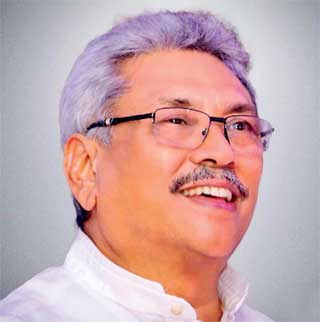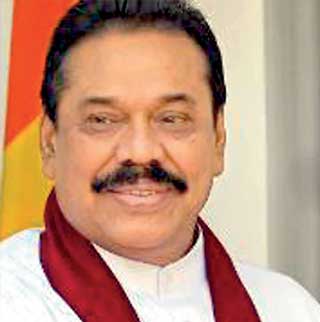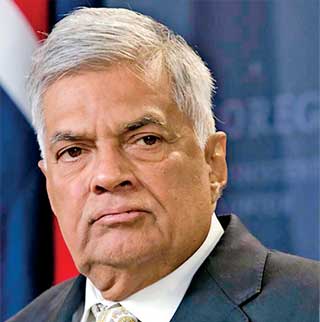Friday Feb 13, 2026
Friday Feb 13, 2026
Friday, 29 October 2021 00:04 - - {{hitsCtrl.values.hits}}

The country’s financial problems are due to long-ignored issues; the situation has forced the President to address basic issues and hopefully the crisis will end in a few years

The financial situation is the result of massive expensive projects with high-interest foreign loans without bringing returns, mostly by the Mahinda Rajapaksa Government

In 2003, then PM Ranil Wickremesinghe considered 800,000 staff in Government as excessive and reduced numbers to 650,000; today Government staff totals 1.9 million
 The country is facing the worst financial crisis, lacking finances to import basic foods and oil, with massive loan repayments pending. The situation has forced the Government to request India for $ 500 million loan for oil imports. When tenders were closed for coal supply to Norochcholai power plant, of four tenders, bids were received only for two, while two were without bidders, with suppliers doubting the country’s ability to finance.
The country is facing the worst financial crisis, lacking finances to import basic foods and oil, with massive loan repayments pending. The situation has forced the Government to request India for $ 500 million loan for oil imports. When tenders were closed for coal supply to Norochcholai power plant, of four tenders, bids were received only for two, while two were without bidders, with suppliers doubting the country’s ability to finance.
Australia fears ending up improvised like Sri Lanka
Recently, Gina Rinehart, Australia's richest woman worth $ 31 billion, has warned that Australia is on the same track as Sri Lanka and Argentina, falling from prosperity to poverty due to big-spending, regulation-heavy government. She urged Australians to be 'on guard' against the 'ruining effects of socialism' in order to preserve the nation's wealth, the Daily Mail reported.
Rinehart urged the Australian Government, which created last year a record $ 167 billion budget deficit. Alluring political words of ‘free this’ and ‘free that’ helped to turn once-prosperous Ceylon, which became independent in 1948, prosperous with tea plantations and other agriculture, into a country which couldn't support itself with food, its people faced hunger, loss of free speech, consequent damaging riots, struggled with the results of its socialist path.
Current situation
Citizens are facing increased prices of rice, sugar, milk and many basics. The Government imposed Maximum Retail Prices and raided hoarders, but the entire exercise was a failure. The Paddy Marketing Board is ineffective, bulk of sugar and milk are imported. Additionally freight rates are climbing, imports are held-up in port without dollars to settle, also clearing delays face port surcharges and penalties.
Reasons
The financial situation is the result of massive expensive projects with high-interest foreign loans without bringing returns, mostly by the MR Government. In 2003, Ranil Wickremesinghe considered 800,000 staff in Government as excessive and reduced numbers to 650,000. Today Government staff totals 1.9 million. Conducting the war needed more military staff, the Ministers loaded the Government with their supporters. Now getting rid will not be easy.
The Parliament is extremely expensive, while MR is alleged to have made over 5,000 overseas trips during his presidency. Ministers and MPs are pampered with salaries and hefty allowances, car permits, also multiple official vehicles, and official quarters, but over 70 are occupied by outsiders. The Government bribed staff with duty-free vehicles, even motorcycles and scooters to junior staff. Of the country’s 85,000 police force, over 40,000 are providing security to politicians.
The inherited massive foreign loans and payments to State staff would have been barely managed if not for the COVID epidemic, shutting down the economy, also expenses in the inoculation program. The crashing of tourism industry was the straw that broke the economy’s back.
Free education
The country boasts of free education from kindergarten to university, but with questionable quality and inability to find employment. Poor subject matter, memorising contents and reproducing same at examinations, overtaking others have led to a selfish population. Same continues in universities.
Over the 70 years of free education, the education authorities failed reforms to the system or retraining teachers. Sirimavo Bandaranaike in late 1990s introduced English medium education. But governments thereafter failed to improve or even continue properly, resulting in arts graduates demanding Government jobs, as the private sector is unwilling to accept them.
Electricity crisis
In the late 1990s the country faced an electricity crisis, with the public facing six-hour power cuts. The CEB signed contracts with private companies to establish power plants purchasing power from Rs. 28 to 40 per unit of electricity, the contracts covering 15 to 20 years. The contracts expired long ago, but are continuously extended.
In 2006, CEB signed an agreement for a 300 MW power plant to run on LNG, but until LNG is delivered, the plant would run on diesel. CEB would pay Rs. 18 for LNG power and Rs. 28 for diesel, meaning if the power plant runs on diesel, with 75% availability, the country would lose Rs. 2 billion a year. Thus CEB should have taken steps to deliver LNG soonest. But for 15 years no firm action, although several proposals were made. The second 320 MW power plant tendered in 2016, is still under consideration.
Recently, CEB called two quotations, one to supply LNG, other for the pipeline – meaning any problems at the connection, both would fight and the country needs to pay.
The above situation forced the President to award 40% of Kerawalapitiya power plant to American company West Coast Power. Also the supply of LNG. Political parties within the Government are unhappy, needs proper explanation.
Solar and wind power
Solar-based roof-top electricity generation commenced in 2010 under net-metering, leading to ‘Sooryabala Sangramaya’ in 2016. Electricity generated were paid Rs. 22 per kWh. Meanwhile, solar technology continues to improve. When CEB tendered for 1 to 10 MW solar power, quoted prices were Rs. 10 to 12, but no awards from CEB. With large solar installations around 100 MW the prices world come down to around Rs. 8. Mannar wind power project producing 110 MW delivers power at around Rs. 7 a unit.
Thus cheapest electricity are solar or wind power, with no escalations. But the development of wind and solar were continuously obstructed by CEB engineers, who benefited from private power producers. This continuous obstruction by CEB engineers made the President invite foreign investments at the UN visit.
 Oil and gas prices
Oil and gas prices
The world’s crude oil prices rose from $ 40 to 80 a barrel and forecasts are reaching $ 100 by year’s end. The Government delayed increasing oil prices possibly until the Budget when real price movement will be visible.
Meanwhile, Sri Lanka is expecting a loan of $ 500 million from India to import oil. It is interesting to compare oil prices in India and Sri Lanka.
Oil refinery
The Ceylon Petroleum Corporation’s 40-year-old Sapugaskanda refinery and the 5.8 km port-to-refinery 5.8 km pipeline are in urgent need of upgrading and expansion. Although number of proposals were made for a new refinery, nothing materialised.
The country inherited the Trincomalee oil tank complex with one million tons capacity. The unused oil tanks were handed over to India in 2003 for a 99-year period. In 2015 Indian PM Modi arrived in Sri Lanka, proposed developing oil tanks jointly, without progress. But now, the Government is reconsidering joint development of Trincomalee oil tanks, for oil storage and a refinery with India.
Moving over to organic fertiliser
The President's election manifesto page 39: “A Revolution in the Use of Fertiliser. Building up a community of citizens who are healthy and productive, we need to develop the habit of consuming food with no contamination with harmful chemicals. In order to guarantee the people’s right to such safe food, the entire Sri Lankan agriculture will be promoted to use organic fertilisers during the next 10 years.”
The President banned fertiliser imports in April 2021. But from the inception of Government, there was no research, planning or even discussions among the academics and researchers in the agriculture sector, resulting in farmers taking up arms, initiated by JVP and the Opposition.
Although compost fertiliser is produced by various parties, their chemical composition and the ability to deliver plant nutrition are unknown. Now, import of various supplements are anticipated, but the yields from Maha paddy crop will be low.
Our farmers were using excessive chemical fertiliser, also excessive pesticides and weedicides. The moving over to organic fertiliser is a good idea, but delivering proper fertiliser while educating the farmer over correct practices could take years.
Our nanotechnology researchers invented organic fertilisers with 40% nitrogen over 10 years ago, but without progress in manufacture. However, with current interest would become the backbone of future agriculture.
Sugar prices and production
Local sugar prices ignore price controls, also difficult to find. World sugar prices are rising reaching $ 507 per ton, almost reaching highest prices reached in January 2017 at $ 535 per ton. The increase is mainly due to the crop failure of the world’s larger producer, Brazil.
Until a few years ago, local sugar plantations and factories were running at a loss, operated at a low level. Meanwhile, local liquor producers were importing alcohol, claiming the quality of local alcohol was unsuitable for their product. Cane syrup after crystallising of sugar leaves molasses which could be converted into alcohol by fermentation. Local sugar factories after collecting sugar were forced to send molasses down the drains due to poor demand for their alcohol. But with the Government ending alcohol imports, sugar factories have increased production and are running at a profit.
Price of milk
Only 40% of milk requirement is locally produced, the balance is imported. With exchange shortages, the importers were unable to clear imported milk powder. Meanwhile, delays cause port surcharges. Our consumers are reluctant to use liquid milk available in packed form. The packers were selling a litre of milk at Rs. 260, but the farmers were paid only Rs. 90–100, how fair? With milk powder shortage, liquid milk packers increased retail price by Rs. 20 to Rs. 280, but milk farmers received only Rs. 7 extra.
Cows in developed countries yield 25 to 30 litres of milk a day, but our rural cattle farmers get only 2.5 litres a day. Why? Cows abroad stay in one place and are fed with grass and nutrients, to convert them into milk. Our cows have to roam over looking for grass, spending their energy.
The National Livestock Development Board controls over 14,000 ha of land and manages the largest stock of cattle in the country, but their average yield is only 2.5 litres a day. Meanwhile, private farms have achieved milk yields of developed countries.
For example: Ambewela Dairy Farm owned by Lanka Milk Foods spread across 1,500 acres using imported cattle, continued by artificial insemination, each cow produces 22-24 litres of milk per day. Watawala Plantations, a tea plantation company, runs a dairy project on a 50 ha land, managing a herd of 1,600 dairy cattle, producing around 18,000 litres of fresh milk per day.
Our local dairies have produced butter and cheese of acceptable quality and are selling at lower prices than imported.
Rice
Price of local market rice is climbing, not due to shortages, but with manipulation by large rice mill owners. After the Government withdrew price control, rice millers agreed to a new price system. But the Minister wished to offer public imported rice below Rs. 100 a kilo. The current increase is apparently in protest of the Government decision on imports.
The Government lost the ability to control rice prices, when it abandoned its paddy mills, capable of converting purchased paddy to rice. In the 1970s the State Engineering Corporation was given the contract to construct eight massive paddy storing silos and rice mill complexes around the country. I was in charge of the construction of the Hasalaka mill’ when I visited the facility a few years ago, the mill was abandoned and houses covered the grounds. The Polonnaruwa mill today is occupied by a garment factory.
Government actions and reactions
President Gotabaya took over the country with hopes and plans to develop the country. But the country was heavily indebted, the worst situation ever. Meanwhile, COVID-19, which affected the entire world, crashed the tourist industry. Loss of tourism income and expenditure in vaccine imports, while settling past debts, made import of other goods near impossible. The Government was forced to borrow from friendly countries, even Bangladesh.
Sri Lanka is possibly the only country where staff salaries were not curtailed, but the excessive staff were idling even during better times.
Under the situation development needed a different approach, instead of investments with borrowings, the country is forced to request foreign investments on projects, but JVP and the Opposition refers action as sale of country’s assets.
Power shortage
The country, blessed with sunlight and heavy winds, incurs heavy expenditure on power generation. When the entire world is moving towards renewable energy, CEB has been obstructing every move over the past years. At the President’s visit to UN, he invited investors in various fields including solar and wind power.
A few days ago, Daily FT reported that a Chinese firm offered to invest $ 800 m on renewable energy projects. In addition, an Omani company is interested in solar parks. But CEB wishes for tenders to be called, which would allow them to prepare tender documents, call tenders and evaluation prior to award, which may take minimum three years. Meanwhile, they could continue to purchase power from local companies at around Rs. 35 a unit.
South India has number of foreign investments in solar and wind power. India’s grounds are large and rainfall low, thus lower cost production is possible. Any foreign offer for a similar project could be compared with India and awarded, saving three years. The next project could be compared with the first, this is the only way to reach 70% renewables by 2030.
LNG power
The American West Coast Power signed an agreement to purchase 40% of Yugadhanavi power plant for $ 250 million. In addition, the company is interested in supplying LNG for the next 10 years. Our LNG requirement existed for 15 years, but CEB dragged on and failed to achieve. A few months ago the CEB opened tenders for LNG supply and pipeline, deliberately sabotaging the LNG supply project, as the two parties would fight with each other.
The President had no choice other than to entertain the American company.
Jobs for youth
The State sector is already overstaffed with nearly 1.9 million employees. Thus any employment opportunities should come from the private sector. But our schools and universities are unable to produce acceptable youngsters. Thus the Government has to amend school and university curricula accordingly, a massive task.
The President at the UN conference presented ‘Investment Opportunities in Rising Sri Lanka 2022,’ which highlighted lands available for foreign investments which would generate employment opportunities for youth. But they need to be efficient in English and also Information Technology.
The President's target
Give the country’s foreign exchange crisis, which is making the country almost bankrupt, recovery is a massive challenge. The President’s objective in inviting foreign investors is looked upon by the Opposition and the left as sale of the country’s assets.
A number of investors have accepted the President’s invitation for solar and wind power projects. Already Chinese and Omani companies and also Indian billionaire Gautam Adani have shown interest. As solar/wind power plants could exceed 1,000 MW, each could be accepted if the rates are comparable with established in South India.
To resolve the milk shortage, the President allocated lands from NLDB to private companies. Their milk will reach the market in about a year and the country will attain self-sufficiency in around three years.
As for university graduates without possibility of Government employment, education in schools and universities need drastic changes. The President has already proposed IT degree courses for 3,500 arts graduates, making a beginning in education reforms.
The President's immunisation programme has succeeded and the country is coming into normalcy and tourism expects fast improvement, easing foreign currency tightening. Most hopes are on foreign investments; if successful, youth may no longer need to stay in passport queues.
The country’s financial problems are due to long-ignored issues, the situation has forced the President to address basic issues and hopefully the crisis will end in a few years.